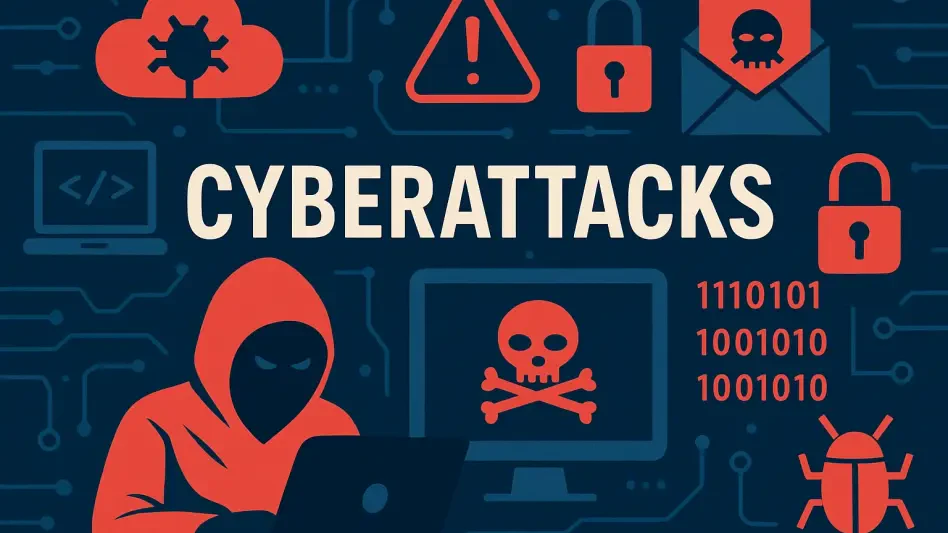In a world increasingly dependent on digital infrastructure, the vulnerability of critical sectors to cyberattacks has become glaring. The year 2024 witnessed significant cyberattacks targeting France’s essential services, including government departments and industries such as telecommunications, media, finance, and transportation. These orchestrated attacks exploited three zero-day vulnerabilities in Ivanti Cloud Services Appliance devices, sending ripples through key sectors and highlighting the pressing need for bolstered cybersecurity measures. This scenario underscores the intricate challenges posed by state-sponsored cyber espionage and the urgent demand for preemptive strategies among vulnerable organizations.
French Infrastructure Under Siege
The Attack and Its Mechanisms
The cyberattacks manifested through a sophisticated methodology involving vulnerabilities known as zero-days. These are previously unknown security flaws that attackers exploit before developers can issue fixes. In France’s case, three such vulnerabilities in Ivanti’s Cloud Services Appliance devices became the gateway for significant breaches. The exploitation process involved strategies such as embedding rootkits and utilizing open-source tools, Virtual Private Networks (VPNs), and dedicated servers to disrupt key infrastructure. Despite Ivanti facing criticism for recurring vulnerabilities, the magnitude of these intrusions went beyond technical oversight, emphasizing how cyber sophistication can outpace standard defense mechanisms.
Targeted attackers leveraged these vulnerabilities through an advanced intrusion set identified as Houken. This set effectively bypassed organizational defenses, gaining unauthorized access to systems and potentially allowing for unauthorized data collection. The sophistication of the attack extended to the utilization of rootkits, thus enabling deeper access into systems while concealing malicious activities from detection. These tactics provided attackers with considerable leverage over compromised systems, highlighting an alarming trend where traditional defenses falter against evolving cyber threat landscapes.
Attribution to State-Sponsored Actors
The attribution of these attacks to UNC5174, a former member of Chinese hacktivist groups, reinforces the notion that state-sponsored cyber espionage is a persistent reality for national infrastructures. Known under the persona “Uteus,” this actor is suspected of operating as a contractor for China’s Ministry of State Security. This connection is crucial as it indicates the strategic nature of the cyberattacks, where vulnerabilities in edge devices are exploited for espionage purposes. This operational synergy between a sophisticated intrusion toolset and a determined state-backed actor underlines the geopolitical dimensions influencing modern cyber warfare.
Furthermore, examining the role of UNC5174 highlights a broader narrative of state-sponsored hacking prioritizing intelligence gathering and access acquisition. These operations are intricately planned, often utilizing unconventional means to achieve geopolitical goals without overt confrontations. The linkage to “Uteus” and the sophistication of the techniques employed underscores the complex landscape of cyber espionage, where the fusion of ambitious intentions and technological prowess poses grave threats to national security.
Response from Cybersecurity Authorities
National and International Alerts
Amidst the unfolding cyber scenario, the French National Agency for the Security of Information Systems (ANSSI) acted promptly by attributing the attacks to UNC5174 and issuing warnings regarding the Ivanti zero-days. ANSSI’s engagement outlines crucial steps adopted at national levels to mitigate risks stemming from cyber threats. Their collaboration with international cybersecurity bodies further emphasizes the necessity of sharing vital intelligence, establishing a united front against evolving cyber challenges. The rapid dissemination of information acted as a deterrent, potentially thwarting further exploits by galvanizing prompt protective actions across various sectors.
Similarly, the Cybersecurity and Infrastructure Security Agency (CISA) issued a warning in January, highlighting threats posed by the Ivanti zero-days. These alerts served as an essential reminder for organizations to prioritize system updates and implement robust security frameworks. Lack of vigilance or complacency could lead to severe repercussions, illustrating the critical importance of staying informed about potential threats and being proactive in countering them. The joint efforts of national and international bodies reaffirm the collective responsibility in addressing the complexities of modern cybersecurity threats.
Enhancing Cybersecurity Measures
The emergence of these cyberattacks underscores the urgency for extensive reforms and investments in cybersecurity infrastructure. Ivanti’s call for customers to upgrade to patched versions of affected platforms is a step toward mitigating risks, emphasizing the importance of proactive measures over reactive responses. The growing instances of zero-days and threat actors exploiting them necessitate incorporating advanced threat detection and response systems within organizational frameworks.
Moreover, this scenario demands organizations across sectors to reassess their cybersecurity postures. Emphasizing frequent software updates and investing in cutting-edge technologies can counter the sophisticated nature of prevailing threats. While technological advancements progress, vigilance through constant monitoring and adaptive strategies remain quintessential to safeguarding vital infrastructure. The lessons from these attacks herald an era where cybersecurity stands as a strategic pillar for nations, underpinning the seamless functioning of their critical infrastructures.
Toward Reinforced Cybersecurity
As the world increasingly relies on digital infrastructure, the susceptibility of critical sectors to cyberattacks has become alarmingly apparent. In 2024, France faced major cyber threats targeting its essential services. Key government departments, along with industries like telecommunications, media, finance, and transportation, became victims of these coordinated cyberattacks. The attacks capitalized on three zero-day vulnerabilities within Ivanti Cloud Services Appliance devices, causing widespread disruption across vital sectors. This situation spotlights the urgent need to strengthen cybersecurity measures against such threats. Moreover, it illuminates the complex challenges posed by state-sponsored cyber espionage activities. It also emphasizes the immediate necessity for preemptive strategies by organizations that are highly susceptible to these attacks. The events of 2024 illustrate how crucial it is for nations and businesses to protect their digital frameworks proactively, ensuring they are guarded against the ever-evolving landscape of cyber warfare and espionage.








